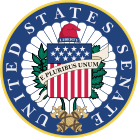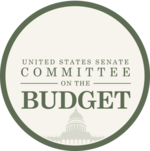From Wikipedia, the free encyclopedia
Standing committee of the U.S. Senate
The United States Senate Committee on the Budget was established by the Congressional Budget and Impoundment Control Act of 1974 . It is responsible for drafting Congress's annual budget plan and monitoring action on the budget for the Federal Government. The committee has jurisdiction over the Congressional Budget Office . The committee briefly operated as a special committee from 1919 to 1920 during the 66th Congress , before being made a standing committee in 1974.[ 1]
The current Chair is Rhode Island Senator Sheldon Whitehouse , and the Ranking Member is Iowa Senator Chuck Grassley .
Contrasted with other committees [ edit ] The Budget Committee should not be confused with the Finance Committee and the Appropriations Committee , both of which have different jurisdictions: The Finance Committee is analogous to the Ways and Means Committee in the House of Representatives ; it has legislative jurisdiction in the areas of taxes, Social Security , Medicare , Medicaid and some other entitlements . The Appropriations Committee has legislative jurisdiction over appropriations bills, which provide funding for government programs.
While the budget resolution prepared by the Budget Committee sets out a broad blueprint for the Congress with respect to the total levels of revenues and spending for the government as a whole, these other Committees prepare bills for specific tax and spending policies.
Majority[ 2]
Minority[ 3]
Lindsey Graham , South Carolina, Chair Chuck Grassley , Iowa, Ranking Member Mike Crapo , IdahoRon Johnson , WisconsinRoger Marshall , KansasJohn Cornyn , TexasMike Lee , UtahJohn Kennedy , LouisianaPete Ricketts , NebraskaBernie Moreno , OhioRick Scott , Florida
Jeff Merkley , Oregon, Ranking Member Patty Murray , WashingtonRon Wyden , OregonBernie Sanders , Vermont[ a] Sheldon Whitehouse , Rhode IslandMark Warner , VirginiaTim Kaine , VirginiaChris Van Hollen , MarylandBen Ray Luján , New MexicoAlex Padilla , California
[ edit ] Historical membership rosters [ edit ]
Majority[ 4]
Minority[ 5]
Sheldon Whitehouse , Rhode Island, Chairman Patty Murray , WashingtonRon Wyden , OregonDebbie Stabenow , MichiganBernie Sanders , Vermont[ a] Mark Warner , VirginiaJeff Merkley , OregonTim Kaine , VirginiaChris Van Hollen , MarylandBen Ray Luján , New MexicoAlex Padilla , California
Chuck Grassley , Iowa, Ranking Member Mike Crapo , IdahoLindsey Graham , South CarolinaRon Johnson , WisconsinMitt Romney , UtahRoger Marshall , KansasMike Braun , IndianaJohn Kennedy , LouisianaRick Scott , FloridaMike Lee , Utah
Majority
Minority
Bernie Sanders , Vermont[ a] Chairman Patty Murray , WashingtonRon Wyden , OregonDebbie Stabenow , MichiganSheldon Whitehouse , Rhode IslandMark Warner , VirginiaJeff Merkley , OregonTim Kaine , VirginiaChris Van Hollen , MarylandBen Ray Luján , New MexicoAlex Padilla , California
Lindsey Graham , South Carolina, Ranking Member Chuck Grassley , IowaMike Crapo , IdahoPat Toomey , PennsylvaniaRon Johnson , WisconsinMike Braun , IndianaRick Scott , FloridaBen Sasse , NebraskaMitt Romney , UtahJohn Kennedy , LouisianaKevin Cramer , North Dakota
Source:[ 6]
Majority
Minority
Mike Enzi , Wyoming, Chairman Chuck Grassley , IowaMike Crapo , IdahoLindsey Graham , South CarolinaPat Toomey , PennsylvaniaRon Johnson , WisconsinDavid Perdue , GeorgiaMike Braun , IndianaRick Scott , FloridaJohn Kennedy , LouisianaKevin Cramer , North Dakota
Bernie Sanders , Vermont,[ a] Ranking Member Patty Murray , WashingtonRon Wyden , OregonDebbie Stabenow , MichiganSheldon Whitehouse , Rhode IslandMark Warner , VirginiaJeff Merkley , OregonTim Kaine , VirginiaChris Van Hollen , MarylandKamala Harris , California
Majority
Minority
Mike Enzi , Wyoming, Chair Chuck Grassley , IowaMike Crapo , IdahoLindsey Graham , South CarolinaPat Toomey , PennsylvaniaRon Johnson , WisconsinBob Corker , TennesseeDavid Perdue , GeorgiaCory Gardner , ColoradoJohn Kennedy , LouisianaJohn Boozman , ArkansasTom Cotton , Arkansas
Bernie Sanders , Vermont,[ a] Ranking Member Patty Murray , WashingtonRon Wyden , OregonDebbie Stabenow , MichiganSheldon Whitehouse , Rhode IslandMark Warner , VirginiaJeff Merkley , OregonTim Kaine , VirginiaAngus King , Maine[ a] Chris Van Hollen , MarylandKamala Harris , California
Majority
Minority
Mike Enzi , Wyoming, Chair Chuck Grassley , IowaMike Crapo , IdahoLindsey Graham , South CarolinaPat Toomey , PennsylvaniaRon Johnson , WisconsinBob Corker , TennesseeDavid Perdue , GeorgiaCory Gardner , ColoradoJohn Kennedy , LouisianaJohn Boozman , ArkansasLuther Strange , Alabama
Bernie Sanders , Vermont,[ a] Ranking Member Patty Murray , WashingtonRon Wyden , OregonDebbie Stabenow , MichiganSheldon Whitehouse , Rhode IslandMark Warner , VirginiaJeff Merkley , OregonTammy Baldwin
Tim Kaine , VirginiaAngus King , Maine[ a]
Majority
Minority
Patty Murray , Washington, Chair Ron Wyden , OregonBill Nelson , FloridaDebbie Stabenow , MichiganBernie Sanders , Vermont[ a] Sheldon Whitehouse , Rhode IslandMark Warner , VirginiaJeff Merkley , OregonChris Coons , DelawareTammy Baldwin , WisconsinTim Kaine , VirginiaAngus King , Maine[ a]
Jeff Sessions , Alabama, Ranking Member Chuck Grassley , IowaMike Enzi , WyomingMike Crapo , IdahoLindsey Graham , South CarolinaRob Portman , OhioPat Toomey , PennsylvaniaRon Johnson , WisconsinKelly Ayotte , New HampshireRoger Wicker , Mississippi
Majority
Minority
Kent Conrad , North Dakota, Chair Patty Murray , WashingtonRon Wyden , OregonBill Nelson , FloridaDebbie Stabenow , MichiganBen Cardin , MarylandBernie Sanders , Vermont[ a] Sheldon Whitehouse , Rhode IslandMark Warner , VirginiaJeff Merkley , OregonMark Begich , AlaskaChris Coons , Delaware
Jeff Sessions , Alabama, Ranking Member Chuck Grassley , IowaMike Enzi , WyomingMike Crapo , IdahoLindsey Graham , South CarolinaJohn Thune , South DakotaRob Portman , OhioPat Toomey , PennsylvaniaRon Johnson , WisconsinKelly Ayotte , New Hampshire
Majority
Minority
Kent Conrad , North Dakota, Chair Patty Murray , WashingtonRon Wyden , OregonRuss Feingold , WisconsinRobert Byrd , West VirginiaBill Nelson , FloridaDebbie Stabenow , MichiganBob Menendez , New JerseyBen Cardin , MarylandBernie Sanders , Vermont[ a] Sheldon Whitehouse , Rhode IslandMark Warner , VirginiaJeff Merkley , Oregon
Judd Gregg , New Hampshire, Ranking Member Chuck Grassley , IowaMike Enzi , WyomingJeff Sessions , AlabamaJim Bunning , KentuckyMike Crapo , IdahoJohn Ensign , NevadaJohn Cornyn , TexasLindsey Graham , South CarolinaLamar Alexander , Tennessee
Majority
Minority
Kent Conrad , North Dakota, Chair Patty Murray , WashingtonRon Wyden , OregonRuss Feingold , WisconsinRobert Byrd , West VirginiaBill Nelson , FloridaDebbie Stabenow , MichiganBob Menendez , New JerseyFrank Lautenberg , New JerseyBen Cardin , MarylandBernie Sanders , Vermont[ a] Sheldon Whitehouse , Rhode Island
Judd Gregg , New Hampshire, Ranking Member Pete Domenici, New Mexico
Chuck Grassley , IowaWayne Allard, Colorado
Mike Enzi , WyomingJeff Sessions , AlabamaJim Bunning , KentuckyMike Crapo , IdahoJohn Ensign , NevadaJohn Cornyn , TexasLindsey Graham , South Carolina
Majority
Minority
Judd Gregg , New Hampshire, Chair Pete Domenici , New MexicoChuck Grassley , IowaWayne Allard , ColoradoMike Enzi , WyomingJeff Sessions , AlabamaJim Bunning , KentuckyMike Crapo , IdahoJohn Ensign , NevadaJohn Cornyn , TexasLamar Alexander , TennesseeLindsey Graham , South Carolina
Kent Conrad , North Dakota, Ranking Member Paul Sarbanes , MarylandPatty Murray , WashingtonRon Wyden , OregonRuss Feingold , WisconsinTim Johnson , South DakotaRobert Byrd , West VirginiaBill Nelson , FloridaDebbie Stabenow , MichiganBob Menendez , New Jersey
^ a b c d e f g h i j k l m n Senator is formally an independent but caucuses with the Democrats.
^ At the beginning of the 107th Congress in January 2001 the Senate was evenly divided. With a Democratic president and vice president still serving until January 20, the Democratic vice president was available to break a tie, and the Democrats thus controlled the Senate for 17 days, from January 3 to January 20. On January 3 the Senate adopted S. Res. 7 designating Democratic senators as committee chairmen to serve during this period and Republican chairmen to serve effective at noon on January 20, 2001.
^ On June 6, 2001, the Democrats took control of the Senate after Senator James Jeffords (VT) changed from the Republican Party to Independent and announced that he would caucus with the Democrats.


